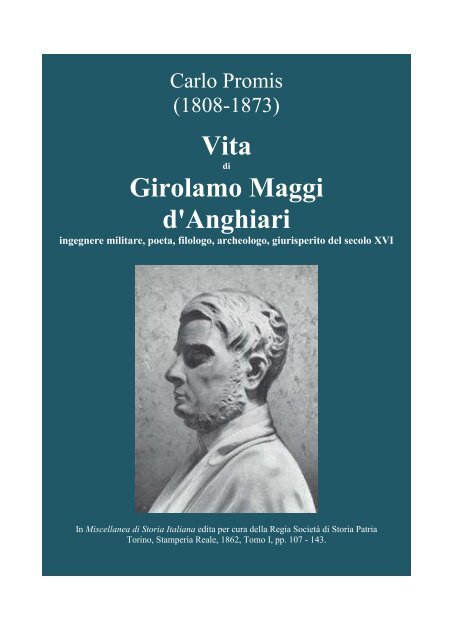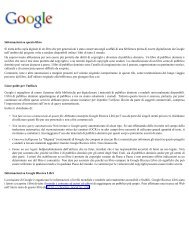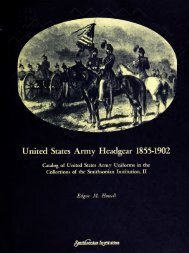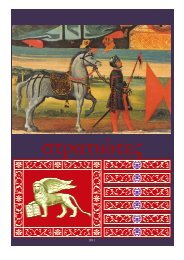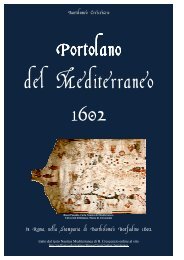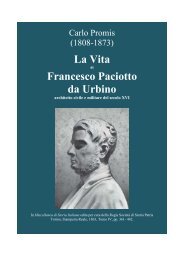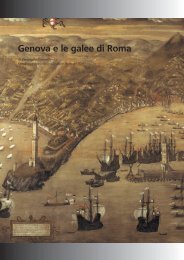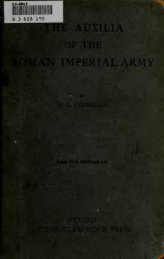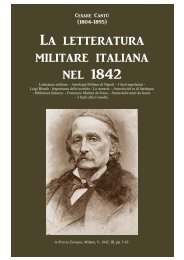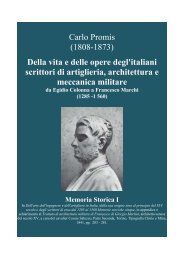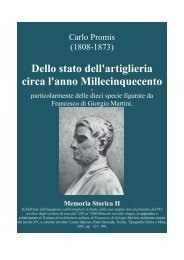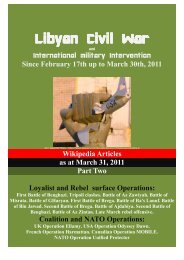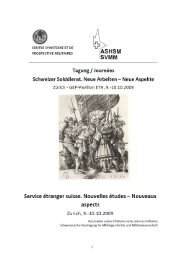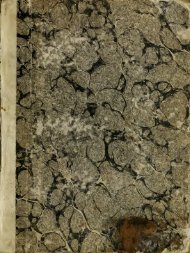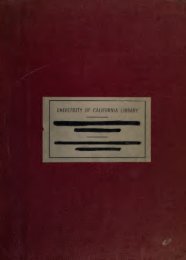Vita Girolamo Maggi d'Anghiari - Libreria Militare Ares
Vita Girolamo Maggi d'Anghiari - Libreria Militare Ares
Vita Girolamo Maggi d'Anghiari - Libreria Militare Ares
Create successful ePaper yourself
Turn your PDF publications into a flip-book with our unique Google optimized e-Paper software.
Carlo Promis<br />
(1808-1873)<br />
<strong>Vita</strong><br />
di<br />
<strong>Girolamo</strong> <strong>Maggi</strong><br />
<strong>d'Anghiari</strong><br />
ingegnere militare, poeta, filologo, archeologo, giurisperito del secolo XVI<br />
In Miscellanea di Storia Italiana edita per cura della Regia Società di Storia Patria<br />
Torino, Stamperia Reale, 1862, Tomo I, pp. 107 - 143.
<strong>Girolamo</strong> <strong>Maggi</strong><br />
From Wikipedia, the free encyclopedia<br />
<strong>Girolamo</strong> <strong>Maggi</strong> (abt. 1523 in Anghiari, Tuscany—March 27, 1572 [1] in Constantinople), or Hieronymus Magius,<br />
was an Italian scholar, jurist, poet, military engineer, urban planner, philologist, archaeologist, mathematician, and<br />
naturalist who studied at Bologna under Francis Robortello. He authored several works, including a collection of poems<br />
on the Flemish wars, (Cinque primi canti della guerra di Fiandra, 1551), one detailing military fortifications (Della<br />
fortificatione delle città, by his friend Giacomo Fusto Castriotto, but edited, annotated, and published posthumously by<br />
<strong>Maggi</strong> in 1564), and several on the subject of philosophy.<br />
Early life and education Little is known about his youth, since neither he nor most biographers were concerned with<br />
recounting or researching it. His year of birth is unknown; several authors have speculated, based on varying access to<br />
information. <strong>Maggi</strong> specifically mentioned how, in infancy, he was attacked by the same pestilence which, in 1563, he<br />
states was the most recent one to occur. This was most likely the black death of 1527 spread by Charles V's Protestant<br />
mercenaries (Landsknechts) when they defeated the French and pillaged the Vatican, but may have been one of the<br />
following year or of three years later. His parents were Paolo and Luisa, who quickly left him an orphan. [1] As a young<br />
man, <strong>Maggi</strong> studied oratory with Pierantonio Ghezzi from Laterina, a master of Latin. Afterwards, to proceed with the<br />
then popular studies, he went at first to the nearby University of Perugia, then to that of Pisa, and finally to that of<br />
Bologna. In Pisa, he attended the lectures of the famous professor of Latin and Greek oratory, Francis Robortello, who<br />
was a faculty member from 1543 to 1549. [1]<br />
Professional life <strong>Maggi</strong>, who beyond his native Tuscan, had mastered Latin and was erudite in Greek, Hebrew, and<br />
Spanish. Availing himself of such endowments, he went into jurisprudence, more to examine its spirit than its<br />
profession. Initially, he studied the method of Andrea Alciato, then that of Bartolo da Sassoferrato and the 14th and<br />
15th century schools of thought. [1] He became interested in ancient history, and quickly began studying epigraphy and<br />
architectonics. As part of this interest, <strong>Maggi</strong> accumulated a large collection of ancient tombstones, including ones from<br />
Como, Ravenna, Rieti, Foligno, Perugia and Rome. In Pisa, where he was still engaged in formal studies, and in other<br />
Italian cities, he visited and examined sepulchres and sarcophagi, and used his growing knowledge to dispute a<br />
universally accepted belief of the time: the idea of the existence of giants in ancient days. All of this work formed the<br />
bases for his tractatus on sepulchres. He worked diligently to provide correct interpretations of ancient works of Roman<br />
law and, for his successful explanation of a section of the Pandects of Justinian, as he himself tells the story, he was<br />
embraced and kissed by Robertello. In Pisa, he probably obtained his doctoral degree in 1546, and returned to his native<br />
land two years later. [1] In 1548, he was requested by his fellow citizens to visit Cosimo I de' Medici, Grand Duke of<br />
Tuscany. He began this endeavor in Venice, the city where in those times, the greatest Italian minds lived quietly and<br />
profited greatly from their studies, due to the vast commerce of books fueled by the carefulness and tolerance of the<br />
government; there he again saw Robortello, and started a friendship with the famous writer Pietro Aretino. <strong>Maggi</strong>, who<br />
had nothing to offer, may have sought protection from Aretino, or hoped to avoid harsh criticism from him, when he<br />
sang the following hendecasyllabic verses, published in his 1551 Guerro di Fiandro (Canto II, verse 56) [1] :<br />
L'uom tre volte chiarissimo e divino The man three times celebrated and divine<br />
Il famoso immortal Pietro Aretino. The famous immortal Pietro Aretino.<br />
Pleased by the words, Aretino sent this poem on the Flemish wars to Chiapino Vitelli, the famous Spanish mercenary<br />
general, in February 1551, along with a letter praising <strong>Maggi</strong>'s talents. Vitelli's family owned much land around<br />
Anghiari, in an area only a few miles from the <strong>Maggi</strong> estate. So, <strong>Maggi</strong> endeavored to please Vitelli, a soldier of<br />
Cosimo, to obtain good entrance at the royal court in Florence. He also praised Giovanni dalle Bande Nere, father of<br />
Cosimo I, whose daring son's rise to the throne of Florence well represented <strong>Maggi</strong>'s goal. In five canti, <strong>Maggi</strong> often<br />
complained about his sad fate, showing himself unhappy with the legal profession exercised by him out of necessity. [1]<br />
Se il giovin quale Ulpian, Bartolo e Baldo<br />
Disturban spesso e l'aspra inopia e dura<br />
Non viene afforza al poetar men saldo,<br />
E a l'avvocar rivolti ogni sua cura;<br />
Io per certo infiammato esser e caldo<br />
A fare il veggio un'immortal scrittura,<br />
Gli dia la vita il Ciel, sostegno e 'l nido,<br />
E 'l gran Cosmo udirà, d'altr'opra il grido.<br />
Although this young man by Ulpian, Bartolo and Baldo<br />
Is often distracted, and severe hardship<br />
Does not assist him with writing verse,<br />
And he turns his attention to legal practice;<br />
Nonetheless I firmly believe that for his fiery temper<br />
I will see him write immortal verse,<br />
Aided by the might, support and protection of the Heavens<br />
And the noble Cosimo will behold that great work.<br />
Ottoman invasion He was a judge and military defense engineer in Famagusta on Cyprus when the island was invaded<br />
by Ottoman Turks in 1571. Besieged by the Turks, he invented machines to defend Famagusta against their attacks.<br />
When the island was conquered, <strong>Maggi</strong> was sent to the dungeons at Istanbul where, locked in chains, he wrote from<br />
memory two detailed treatises, De tintinnabulis, on bells and carillons, and the explicitly illustrated De equuleo, on<br />
torture devices. In attempts to be freed, he dedicated the first treatise to Carolus Rym (Charles Ramire), ambassador to<br />
the Holy Roman Emperor Maximilian II, and the second treatise to François de Noailles, bishop of Aire and<br />
ambassador to the King of France. They were pleased with his works, and endeavoured to obtain his release. Their
efforts, however, were brought to light as he was being released to the Italian ambassador. The prison captain ordered<br />
him to be detained and executed by strangulation. His two treatises were published posthumously in 1608 and 1609,<br />
respectively.<br />
Works<br />
• <strong>Maggi</strong>, <strong>Girolamo</strong> (1551). Cinque primi canti della guerra di Fiandra.<br />
• <strong>Maggi</strong>, <strong>Girolamo</strong> (1562). De mundi exustione, et de die judicii ("On the world's consumption by fire and the<br />
Day of Judgment").<br />
• <strong>Maggi</strong>, <strong>Girolamo</strong> (1564). Miscellanorum, seu Variarum Lectionum.<br />
• Castriotto, Giacomo Fusto; <strong>Girolamo</strong> <strong>Maggi</strong> (1564). Della fortificatione delle città.<br />
• <strong>Maggi</strong>, <strong>Girolamo</strong>. De tintinnabulis.<br />
• <strong>Maggi</strong>, <strong>Girolamo</strong>. De equuleo.<br />
References<br />
1. ^ a b c d e f g Promis, Carlo (1862). "<strong>Vita</strong> di <strong>Girolamo</strong> <strong>Maggi</strong> <strong>d'Anghiari</strong>". Miscellanea di Storia Italiana 1:<br />
105–143.<br />
http://it.wikisource.org/wiki/Immagine:<strong>Vita</strong>_di_<strong>Girolamo</strong>_<strong>Maggi</strong>_d%27Anghiari%2C_Miscellanea_di_storia_<br />
italiana%2C_vol_1%2C_p_105-143.pdf.<br />
Other references<br />
• Short biography. URL accessed 2006-03-06.<br />
[dead link]<br />
• Original documents at Digicoll.library.wisc.edu/.<br />
• D'Israeli, Isaac. "Imprisonment of the Learned". Curiosities of Literature. George Routledge & Sons.<br />
• Ditchfield, Peter Hampson. Books Fatal to Their Authors. URL accessed 2006-03-06.<br />
• This article incorporates content from the 1728 Cyclopaedia, a publication in the public domain.<br />
Further reading<br />
• Buratti, Alessandro. Elogio di <strong>Girolamo</strong> Magi celebre letterato di Anghiari... Perugia, Nella Stamperia<br />
Costantini, Santucci e Comp., 1809. pp 115.<br />
<strong>Girolamo</strong> <strong>Maggi</strong><br />
Da Wikiquote, aforismi e citazioni in libertà.<br />
<strong>Girolamo</strong> <strong>Maggi</strong> D'Anghiari, o Hieronymus Magius (1523 – 1572), poeta, filologo, matematico, naturalista,<br />
ingegnere e archeologo italiano.<br />
• Bene senza dubbio ti parrà cosa maravigliosa che io, prigioniero e nella schiavitù di un Turco, dentro un<br />
ergastolo, privo affatto di libri e dei sussidii della memoria (poiché appena in farsetto scampai alla strage di<br />
Cipro) abbia composto codesto libretto de Tintinnabulis. Ciò non di meno, non vorrei già che tu ignorassi<br />
qualmente Dio 0. M., che mi salvò da infiniti pericoli di terra e di mare, a me qui condotto tosto abbia assistito,<br />
la qual cosa facilmente apparisce: essendoché, mi fece tenere pressoché tutte quelle cose che a' tempi tranquilli<br />
già aveva scritto e portato meco in Cipro, affinché rileggendole potessi qualche volta togliermi dall'animo le<br />
molestie e le cure più gravi. (da una lettera a Carlo Rym, patrizio di Gand, citato in Carlo Promis, <strong>Vita</strong> di<br />
<strong>Girolamo</strong> <strong>Maggi</strong> <strong>d'Anghiari</strong>)<br />
• Gettato lungi dalla patria e dagli amici, non molto danaro m'abbisogna in prestito per riscattarmi dalla<br />
schiavitù. Non sono un vagabondo né un fallito, neppure vorrei vuotare la borsa ad alcuno.<br />
• L'uom tre volte chiarissimo e divino | Il famoso immortal Pietro Aretino. (da Guerra di Fiandra, Canto II,<br />
verso 56, citato in Carlo Promis, <strong>Vita</strong> di <strong>Girolamo</strong> <strong>Maggi</strong> <strong>d'Anghiari</strong>)<br />
• Se il giovin quale Ulpian, Bartolo e Baldo | Disturban spesso e l'aspra inopia e dura | Non viene afforza al<br />
poetar men saldo, | E a l'avvocar rivolti ogni sua cura ; | Io per certo infiammato esser e caldo | A fare il<br />
veggio un'immortal scrittura, | Gli dia la vita il Ciel, sostegno e 'l nido, | E ' gran Cosmo udirà d'altr'opra il<br />
grido. (da Guerra di Fiandra, Canto II, versi 58 e seguito, citato in Carlo Promis, <strong>Vita</strong> di <strong>Girolamo</strong> <strong>Maggi</strong><br />
<strong>d'Anghiari</strong>)<br />
Bibliografia<br />
• M. Gierolamo Magi <strong>d'Anghiari</strong>, al valoroso Signor Chiapino Vitelli, Cinque primi canti della guerra di<br />
Fiandra, Venezia, 1551.<br />
Citazioni su <strong>Girolamo</strong> <strong>Maggi</strong> [modifica]<br />
• D'indole ingenua ed amabile, amò il sapere più per esso che per sé, né mai ributtandosi perché il premio non<br />
seguisse tosto la fatica, né mai la eguagliasse: amico di moltissimi dotti, ebbe talvolta ad esporre opinioni<br />
diverse dalle loro, ma ciò fece con modestia e dolcezza tale, che l'avversario non gli si inimicava mai, cosa rara<br />
sempre, rarissima in quel secolo di sì villane diatribe. (Carlo Promis)<br />
• Non vi fu quasi parte di letteratura che non venisse coltivata: elegante scrittore nelle lingue italiana e latina,<br />
dotto anche nella greca e nell'ebraica, scrisse eruditissimamente di teologia, filologia, giurisprudenza, usi e<br />
costumi antichi: mandò in luce, commentandoli, libri di antichi e di moderni scrittori: fu poeta ed istorico :
Altri progetti<br />
diffuse lo studio dell'architettura militare mediante opere sue ed altrui: versato nelle meccaniche militari,<br />
siccome conoscitore degli autori greci ch'erano a que' tempi i migliori fonti, tentò non affatto infelicemente di<br />
connetterle colle pratiche moderne, cosicché non v'è altri che di questi e de' latini avesse per ogni minuta<br />
questione sì prontamente e copiosamente alla mano ogni squarcio, ogni parola. (Carlo Promis)<br />
(EN) Wikipedia contiene una voce riguardante <strong>Girolamo</strong> <strong>Maggi</strong>


